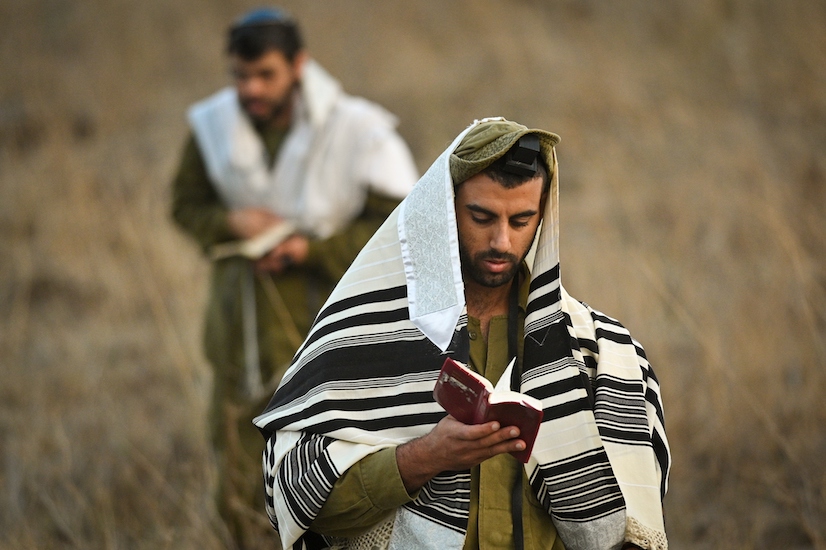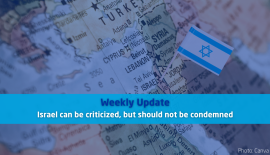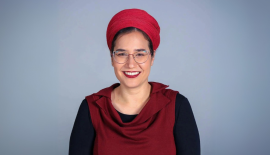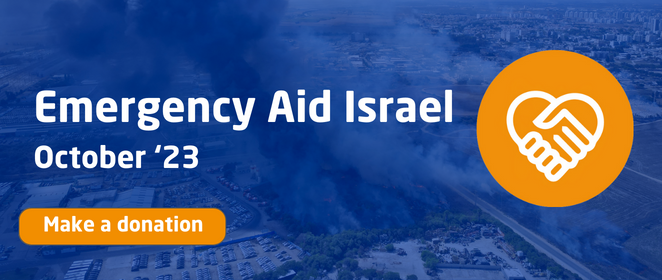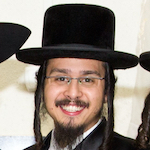Darkness Can Never Extinguish Our Light
With everything that is going on these days there are unfortunately a lot of negative things to write about. But this time I want to write about the good things that resulted from this tragedy on October 7th.
The Jewish scholars taught us that the generation of the tower of Babel had something special. Yes, they wanted to rebel against God. But they were united. They were one people with one mission, which enabled them to build such a huge project. Today we see that the Jewish people is one and has one mission as well.
“Nowadays it seems as if everybody is busy buying or collecting stuff for the army”
Taking care of each other
In the past weeks Israel has called up 360,000 reservists – the biggest mobilization this land has seen in decades. But this is not the only army that was mobilized in the Jewish world. A whole army of civilians stood up worldwide, that helps the Israeli soldiers and first responders by offering food, supplies, prayer and moral support.
Nowadays it seems as if everybody is busy buying or collecting stuff for the army: cooking, baking and delivering food to the soldiers to replenish their rations. In addition, thousands of Israelis were expelled from their homes causing them to be dependent on their friends and neighbours – and even complete strangers – for all the help they need.
“Total strangers made distant mourning visits to the families of the victims to comfort the bereaved”
Tribute
During the first week of the war funerals were held for the dead in their small communities. For security reasons the number of participating mourners was limited. Local residents stood along the streets in tribute while the funeral procession was passing.
When “lonely soldiers” (soldiers without relatives close by, ed.) were buried, hundreds of people attended to honour their memory. At the request of the Chevra Kadisha (burial society) numerous people, including myself, volunteered to dig graves, because the Chevra Kadisha could not manage this on their own anymore.
Total strangers made distant mourning visits to the families of the victims to comfort the bereaved. Many hundreds of people formed long queues, literally filling whole streets, to donate blood.
Civilians bring meals en masse to army bases, offer shelter to evacuees and donate toys to evacuated children. The examples of all this chesed (charity) to our soldiers, Hatzola and ZAKA relief workers, and for the evacuees of the shelled communities in the North and South of Israel are too numerous to describe in one (or even ten!) articles.
Cold and warm meals were collected by civilians in abundance and delivered at army bases all over the country. Evacuees are accommodated and hosted in luxury hotels and are being treated as guests of honour. Huge donations of brand-new toys for the evacuated children are dropped at the hotel lobbies to ease their traumas.
Non-kosher restaurants in secular cities like Tel Aviv were made kosher during the night voluntarily, so that almost 1,000 meals could be prepared for the soldiers on a daily basis. Jewish communities abroad are very active collecting all sorts of life saving necessities and shipping them to Israel. And the list continues with hundreds of small charitable acts that are being performed daily across the entire Jewish world.
One people
Biblical Hebrew is a holy language containing all kinds of hidden messages. The numerical value of the Hebrew word for war (milchama) is 123. What is the solution to a war? Am Echad (one people), which also has the numerical value of 123. Only when we are truly one people and behave as one, then we will be able to win this war.
Interesting to note is that in the first report of October 7, the army reported that 123 soldiers were killed. After the fog of war this number ultimately rose to at least 330. But we don’t believe in coincidence. Maybe this was an early message to us to stand together.
Haman – Hamas
Our scholars also tell us that all prophets and prophetesses were incapable to do what Haman did in one night. For they couldn’t lead our ancestors to do teshuva (return to God). But when “the king took his signet ring from his hand and gave it to Haman” (Esther 3:10), this incited them to immediately return lovingly to God and His Torah.
It is incredible to see the impact Hamas and its cronies have on Jews worldwide, and especially on the Israeli army. There are numerous soldiers who have never kept the Sabbath or have lit the Sabbath candles, who have now taken it upon themselves to actually do this.
“We must unite as one people and return to God and His Torah”
We must unite as one people and return to God and His Torah. There are so many completely secular soldiers who started to eat kosher. Others put on tefillin (phylacteries) every day and pray the morning prayers. There is a great demand for tefillin for our soldiers and Jews from around the world actively work to give each soldier his own set, which is very expensive because they are handmade and handwritten.
Sabbath
The Torah says that we are not allowed to cook on Sabbath day. Therefore all our food or hot water must be prepared prior to the Sabbath day. To keep this food warm, we use special electric hotplates and hot-water urns.
But as a result of the sudden mobilization of hundreds of thousands of reservists the army doesn’t have enough to finance all basic needs for keeping the Sabbath. Therefore every military base is in contact with numerous volunteers to fill this gap and try and provide them with everything they need.
In this way we succeeded on the Friday of both the first and the second week of the war to send a minibus chock-full with electric hotplates, hot-water urns, kippas, prayer books and all sorts of Sabbath delicacies to the army bases in the North. These were all donated by people from our neighbourhood in Jerusalem. Because it is like we say in a popular Sabbath song: “Ki Eshmerah Shabbat E-l Jishmereeni” (“When I guard the Sabbath – God will guard me”).
Tzitzit
Like there are so many soldiers who started keeping Sabbath, even many more started to wear tzitzit ( tassels). So many even that there is a great demand for them in the army. The Mitzvah (commandment) to wear tzitzit is given twice in the Torah, namely in Numbers 15:37-41 and in Deuteronomy 22:12.
The Sefer ha-Chinuch, a classic 13-century Jewish writing, says that we wear tzitzit to always remind us of God’s commandments. Because there is no better reminder than wearing the “seal of the Master” on the clothes one wears at all times. Furthermore, the Midrash, the collected Jewish memories, indicates that the numerical value of the word tzitzit is 600. If one adds the eight wires of every corner of the garment, plus the five knots with which these eight wires are tied, we reach 613. An allusion to the 613 Mitsvot (commandments) of the Torah.
There is a screenshot of a WhatsApp-chat that is massively distributed on Jewish social media. The chat is about a mother whose daughter is drafted: “Now you are among all these soldiers, you must start looking for a nice Jewish boy for yourself”, the mother wrote. The daughter replied: “A couple of days I could have done that. But now I cannot say who’s dati (religious) and who is not, everybody wears a kippa and tzitzit.”
But just like all the Sabbath necessities the army doesn’t have the money or the time for this. So, worldwide numerous projects emerged, in which orthodox-Jewish high school students, men and women are preparing tens of thousands of army-green tzitzit. Although there are many campaigns underway to help the IDF, this one is unique because it is also “spiritual”. As religious Jews this is for us just as important as all the other campaigns, because this will provide spiritual protection for our soldiers. It reminds them at all times of who they are and that God is with them all the time.
Enhanced connection
Rabbi Avremi Lehrer regularly helps patients and staff of the Barzilai Hospital in Ashkelon with putting on Tefillin. But there is one doctor who kindly refused every time.
This hospital was the medical epicentre after the horrific terror attacks on October 7th. After a number of very intense days Rabbi Lehrer finally brought his Tefillin for the staff and the victims. The doctor who never didn’t want to put on Tefillin came to him and asked if he could put on the Tefillin.
“When Jews are murdered simply because they are Jews, then our reaction to this is to enhance our connection to God”, the doctor explained. While the doctor put on the Tefillin Rabbi Lehrer burst into tears.
Israeli metamorphosis
Last Sunday night (October 29th), the IDF succeeded in liberating an Israeli soldier from Gaza, who was captured on October 7th. A few moments after hearing this news, the secular tv-host Sharon Gal, during a live broadcast on the Israeli Channel 14, asked an orthodox Jewish guest to lend him his kippa to say a bracha (blessing) to thank God for this news: “Baruch atah Hashem, Elokeinu Melech ha-Olam, matir asurim!” (Blessed art Thou Lord our God, King of the universe, who releases the captives). Watch the video here.
A couple of months ago it looked as if Israel was on the eve of a civil war, that was all about the supposed religious identity of the State of Israel. Now, after these three difficult weeks, we see that non-religious Jews in all of Israel connect themselves to their Jewish roots in the most profound and inspiring way.
That is the impact that Hamas has on our people. Instead of dividing us, or separate us from God, it only caused that we grew closer to our Father in heaven.
“He who blesses the Jewish people, will be blessed. But he who curses them, will see their light!”
Who blesses you
Last Sabbath we read about God’s commandment to Abraham to leave his homeland. One verse further we read that God tells him: “Who blesses your people – the Jewish people – will be blessed; and who curses you, I will curse”. But when we look at the Hebrew words, we see a lack of consistency.
In the verse “He who blesses you, will be blessed” the Torah uses the same word to describe a blessing: Baruch (blessing). But when it comes to the curse, it says: “He who curses you (Umekalelcha), I will curse”, but the Torah doesn’t use the same word to describe the curse. It should say “Akalel”, I will curse. But instead it says “Aor”.
Maybe we can explain this inconsistency with the fact that the word “Aor” also contains the word “Or”, which means “light”. So, we also could read the verse like: “He who blesses the Jewish people, will be blessed. But he who curses them, will see their light!”.
Our light
When you are with us in our darkest times, if you are our friend; then you will be blessed. But if you curse us, then you will see our light. Then you will be on the fast track to see what the Jewish people is capable of. You will see how we unite. How we return to our Heavenly Father and His commandments.
You will witness a people that is more resilient than anything else. You will see people doing voluntary work, pack food, ship supplies, visit army bases, cook meals and make tzitzit. You will see well-known singers who sing at army bases and hospitals to encourage their brothers; dance, unite and laugh. A people that mourns together and is one. Our enemies thought that they could bring darkness. But they couldn’t imagine how bright our light is shining just now.
The darkness can never extinguish our light
And how befitting it is that God too makes this promise to Abraham when he is about to go to the Land of Israel. Darkness is simply the absence of light. As long as we shine brightly as a people, then we will make sure that the darkness of our enemies will never have a place in this world. The Jewish people is – and stays – the source of bright light in this world. The enormous amount of chesed (charity) that is being done in Israel and all over the world is part of that light that will carry us through this darkness.
And no amount of darkness can extinguish this light.
